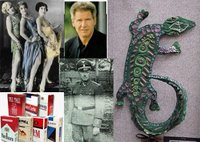
In the early 1900s, everything was illegal. World War I happened. People drove old cars called "Tin Lizards." The first car was invented by Harrison Ford. Ford also discovered the assembly line.
The 20th century started in 1920.
The women in the 1920s wore miniskirts called "flappers" and the men wore little round hats. Everybody went to a bar called the Speakeasy. It was called that because it was the only place you could speak about things and not get arrested. Sometimes the bars got raided by special police called the Gestapo, or G-Men.
In the 1920s people listened to singers like Frank Sinatra, Fat Domino, and The Beatles. Cars, telephones, television and movie theaters were all invented in the 1920s.

In the 1920s women finally got the right to bare shoulders. Women got the right to vote but it didn't really do any good. In the 1920s women burned their bras, went to protest marches, and smoked cigarettes in public.
The 1930s are also called the Roaring 20s. In the Roaring 20s, people used slang expressions like "groovy," "far out," and "it's raining cats and dogs."

In the 1930s the stock market crashed. People who were in the stock market or standing right outside when it crashed got hurt very bad or even killed. People were jumping out of windows trying to get away from the stock market crash. After the stock market crashed, everybody got very depressed.
In the 1940s there were a lot of things that happened in our world, with prehistoric dinosaurs. There were a lot of knocking down buildings by prehistoric dinosaurs. Dinosaurs were harmful creatures in the 1940s. On television shows from the 1940s you will sometimes see dinosaurs walking on buildings and making loud noises.

World War II is also known as the Vietnam War. The Vietnam war started in 1942 when North Korea bombed Pearl Harbor. Pearl Harbor was a famous blues singer. Vietnam happened in Europe. Vietnam started when Franklin Eleanor Roosevelt was President. Vietnam was an important time in history because we gained control of China.

In the 1950s, Rodent Nickson was President. He was a good looking man, slick hair, good dental records. Sure, he had a little big nose and chubby squirrely cheeks, but hey, who doesn't?
Nickson got in trouble for making tapes of people without telling them. This was called Watergate. Nickson said he didn't have anything to do with it. He said he was somewhere else playing checkers. Nickson was making a lot of speeches trying to get people to believe him but all he was really trying to do was get re-elected. Nobody believed Nickson. He was defeated under a landslide by Robert F. Eisenhower.
Peter Pan came out in 1955. Peter Pan was an actor. He was in lots of plays. He always wore a green suit.
In the 1960s, John F. Kennedy landed on the moon. Color was invented in the 1960s. The Civil War ended in the 1960s.
The hippies were trying to stop the war so they invented the peace sign. The hippies were called that because they had hair down to their hips. They all rode motorcycles, wore sunglasses, took their shoes off, and carried signs around.
The most exciting thing was probably Woodstock. All the hippies got together and slept in their cars, smoked grass, made love, and grew long hair. Woodstock lasted for several months, but then it rained and everybody got drafted or had to go home.
The 1960s wasn't all war and partying. The 60s also brought changes in slang, like "Slip me some skin," "Peace," and "I'm a happenin' cat."
In 1969, John F. Kennedy got shot in his car and drove off a bridge. John F. Kennedy was shot by Richard Nixon. Kennedy was assinated by a guy from the Texas Suppository.
In 1972 they stopped making '57 Chevys. In the 1970s Jimmy Carter pardoned Nixon for whatever he did.

In the 1980s Ronald Reagan seized power. Ronald Reagan made lots of movies when he was President of California. Everyone voted for Reagan because he was an actor. Some people want to put Ronald Reagan's head on that mountain because he's just as old and important as any of those other dudes up there. Ronald Reagan isn't dead, but some people really like him anyway.

History is important because if it wasn't there, all the history teachers would be out of a job, and we have enough unemployment as it is. We should all be grateful to our forefathers for giving us a past and a future.




 I love this song.
I love this song. In the early 1900s, everything was illegal. World War I happened. People drove old cars called "Tin Lizards." The first car was invented by Harrison Ford. Ford also discovered the assembly line.
In the early 1900s, everything was illegal. World War I happened. People drove old cars called "Tin Lizards." The first car was invented by Harrison Ford. Ford also discovered the assembly line.




